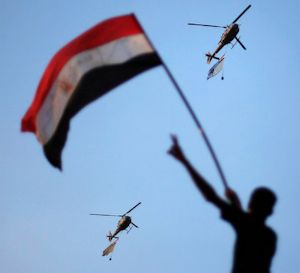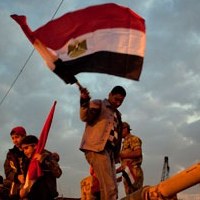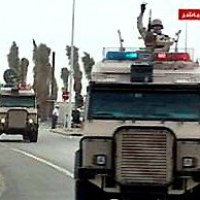![]()
Tue, July 2, 2013 | RubinReports | By Barry Rubin

Egyptian military helicopters circled over Cairo with national flags attached, Monday July 1, 2013. (Photo: Suhaib Salem/Reuters)
The Egyptian army says it will not take power after all if its warning of a 48-hour deadline would be ignored by government and opposition.
But what will it do? Now the opposition has been given a real expectation that it can prod the army into action by continued demonstration.
And the regime can conclude that with the army bluffing it can escalate repression.
And the country’s economic situation will continue to worsen.
And the parliamentary elections are tied up in court disputes, with the country basically having no functioning parliament.
In other words, while the army doesn’t want to take power what will it do as conditions worsen?
And if it does nothing Egypt will eventually descend into real chaos.
So either the army will take over — directly or by appointing a new government (probably the latter) — or the Brotherhood will probably evolve into a dictatorship or the Brotherhood will lose the next election and leave power gracefully (hard to believe).
Meanwhile, opposition leaders rejoiced.
Tamarod spokesperson Mahmoud Badr welcomed the statement, according to the Egypt Independent:
“The army responding to the demands of the people crowns our movement,” he said, adding that Tamarod has embodied the will of the Egyptian people to demand early presidential elections.
Badr added:
“The army statement said our youth are the best in Egypt, opposing a year of what the newspaper called ‘a year of perceived fascism by the Muslim Brotherhood is ended and the revolution is put back on track’.”
Mohamed Abdel Aziz, another campaign leader, said:
“[President Muhammad] Morsi is no longer a president, we call on the masses to take to the streets and besiege [the] Qubba and Ettihadiya [presidential] palaces at 5 pm Tuesday.”
Today there is no government in Egypt.
Here is a list of a few July 2 protests from both sides:
Cairo
Static protests remain in Tahrir Square, outside the Presidential Palace at Itihadiya and at the Rabaa Al-Adaweya mosque in Nasr City. Further large demonstrations are likely at each of these locations on the evening of 2 July. Further protests are likely in the Moqqatam area of Cairo.
On 2 July marches will begin in the early evening in the following areas:
— Shubra at Khalafawy Square then to Abu Wafya Bridge and Sekket al-Wayli en route to the Presidential Palace;
— Mattariya Square to Ter’et al-Gabal Street to the Presidential Palace Masr W’al Sudan Street to the Presidential Palace;
— Nour Mosque in Abbassiya then to Roxy Square, and then from al-Tahra bridge to Qubba palace.
Alexandria
Static protests are in place at the Sidi Gaber train station and the Ibrahim mosque.
Two anti-regime marches are planned to begin in the Victoria and Kaed Ibrahim areas, heading to Sidi Gaber.
Two marches in support of the President are planned, one to begin from the Sidi Bishr Mosque east of the Governorate, the other starting in the Bitash area west of the Governorate.
Luxor
Jamaa al Islamiya is organizing a march in Luxor beginning at 1900 from Abu Haggag Square around the main streets of the governorate and back to the starting point where they are planning to sit in.
Protests are likely in large towns in the Nile Delta, the cities on the Suez Canal and in large towns in Upper Egypt. Jamaa Islamiya is organizing marches in 11 governorates tonight.
Barry Rubin is director of the Global Research in International Affairs (GLORIA) Center and editor of the Middle East Review of International Affairs (MERIA) Journal. His next book, “Nazis, Islamists and the Making of the Modern Middle East,” written with Wolfgang G. Schwanitz, will be published by Yale University Press in January 2014. His latest book is “Israel: An Introduction,” also published by Yale. Thirteen of his books can be read and downloaded for free at the website of the GLORIA Center including “The Arab States and the Palestine Conflict,” “The Long War for Freedom: The Arab Struggle for Democracy in the Middle East” and “The Truth About Syria.” His blog is Rubin Reports. His original articles are published at PJMedia.



 RSS
RSS










Latest Comments
Hello Mike, Thank you for your positive feedback to the article. I felt there wasn’t too much critical analysis of ...
Thanks for this considered and well constructed article. A follow up article on the manner in which the editorial contro...
THE CLUELESSNESS OF CLAIMING THAT OBAMA'S MIDDLE EAST POLICIES WERE A FAILURE CANNOT BE FURTHER FROM THE TRUTH, WHAT THE...
As long as Obama is the president of the usa do not trust the us government......
Thank you for an good read....